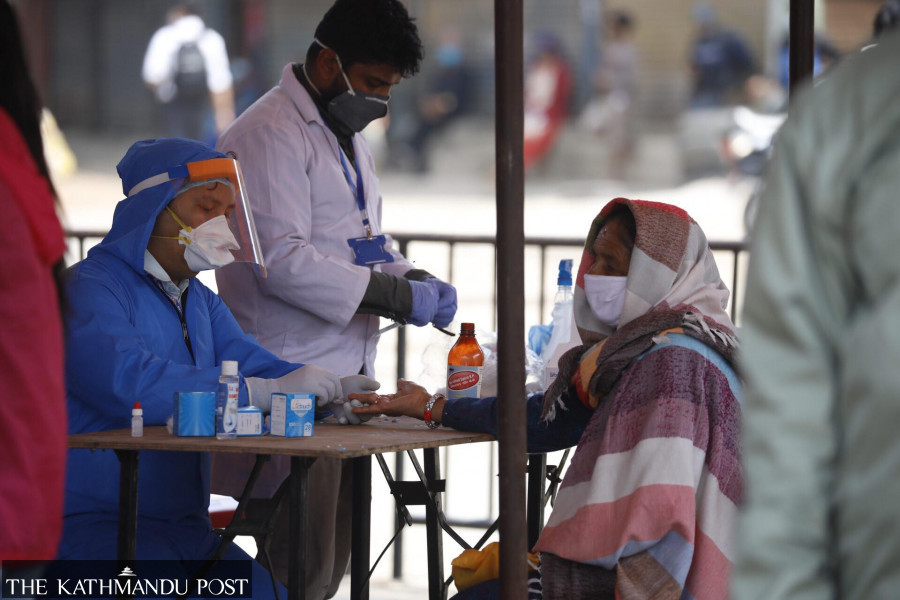Health
After authorities failed to ramp up antigen tests, kits are close to expiry
Health Ministry in May planned 25,000 antigen tests a day, but the number hovered around 5,000. Experts say no one is paying attention to testing, the first step in fighting the virus.
Arjun Poudel
In the last week of May, the government sent around 1.7 million antigen test kits to different parts of the country, with a view to ramping up tests in light of the rising number of cases in the rural areas. The Ministry of Health said it had plans to perform over 25,000 antigen tests a day. But like any other government plan, it also seems to have remained in drawers. The number of tests per day hovers around just 5,000.
Hundreds of thousands of antigen test kits are now close to their expiry, just as the number of infections in communities continues to rise. On Monday, the Epidemiology and Disease Control Division (EDCD) issued a circular asking all concerned agencies to perform the maximum tests possible on the basis of “first expiry first out”.
“This is yet another bungling by our authorities. Had they stuck to their plan of conducting around 25,000 antigen tests every day, the situation would have been different,” said Dr GD Thakur, former director at the Epidemiology and Disease Control Division. “Testing is the first of the three Ts, the other two being tracing and treating, considered the most effective measure to contain the virus spread.”
After Nepal escaped somewhat unscathed from the first wave of the pandemic, which began in January last year, complacency set in among the authorities. But when the second wave hit the country in April third week, Nepal’s health system cracked under the strain as cases surged.
Experts stressed ramping up tests—both polymerase chain reaction and antigen.
Until the last week of May, labs performing polymerase chain reaction (PCR) tests were running in full capacity. The number of PCR tests performed daily was somewhere around 20,000. But the government lacked antigen test kits.
In response to the second Covid-19 wave in Nepal, several countries came forward to extend support with various medical supplies, including antigen test kits.
But despite the plan, testing could not be increased.
Over the past few weeks, the number of daily PCR tests has been around 10,000, and these tests are being done mostly by healthy people flying abroad, as they need to produce a Covid-19 negative certificate. Antigen tests, however, were meant to be performed mostly in the rural areas so that the infection rate of the coronavirus could be assessed and measures taken accordingly. Antigen tests were meant for those with symptoms and those who came in close contact with the infected.
On an average, if the numbers of the last 15 days provided by the Health Ministry are anything to go by, just a little over 4,000 antigen tests are being performed daily across the country.
The daily PCR test numbers provided by the government also include those infected who want to check if the results come out negative, thereby creating confusion about the new cases.
As far as antigen tests are concerned, officials say the Health Ministry was to blame for the fewer number of tests.
“Antigen testing could not be increased after a decision to stop free testing. The Health Ministry is to blame for the failure to increase the number of antigen tests in rural areas,” said an official at the EDCD who spoke on condition of anonymity because he feared retribution. “The Ministry of Finance is also responsible, which did not allow the Health Ministry to hire around 1,000 staffers for contact tracing.”
The failure to ramp up testing despite enough kits delivered by various countries also indicates how authorities in Nepal often fail to utilise the assistance extended as a goodwill.
Officials say the problems started after the erstwhile government decided not to provide free testing. The reduction in number of tests, including antigen tests, massively affected contact tracing, a key component in measuring and checking the spread. Even swab samples collected for contact tracing were discarded without performing tests on them.
People too stopped seeking tests as they had to pay for them.
But when the Health Ministry in May rolled out more than a million antigen test kits, the Epidemiology and Disease Control Division proposed that at least 1,000 staff be hired throughout the country to make contact tracing effective.
Officials say the government did not approve the budget for the purpose.
An official, who retired recently, said the ego of some senior officials with little knowledge of the health sector and the pandemic too affected the country’s response to the virus. “It was very difficult to make them understand why testing, tracing and treating are the key elements in the fight against the virus,” said the official who also did not wish to be named to avoid being dragged into controversy after retirement.
Mahendra Prasad Shrestha, who served as chief specialist at the Health Ministry, says the cases were bound to rise as authorities stopped testing, tracing and treating.
“Multiple and contradictory messages were disseminated by different officials creating confusion among the health workers in the field assigned to perform tests,” Shrestha told the Post.
Public health experts say they have insisted on testing since the pandemic started, as it is the only way to know the status of infections in communities.
“Our focus shifted to vaccination. There is no doubt that vaccination is extremely important and efforts must be made to vaccinate as many people at the earliest,” said Dr Prabhat Adhikari, an infectious disease and critical care expert. “But we should not ignore the significance of testing.”
Though the vaccination drive has resumed after doses started to arrive, it has still been sluggish for the lack of enough vaccines.
So far, 4,570,553 people (around 15.23 percent) received their first dose and 2,888,360 people (around 9.62 percent) have been fully vaccinated.
On Wednesday, 2,616 people tested positive in 10,907 polymerase chain reaction tests and an additional 865 people tested positive in 5,749 antigen tests. In the last 24 hours, 30 deaths have been recorded from Covid-19. As of Wednesday, 10,180 people have died of the coronavirus since the start of the pandemic.
The Health Ministry said that there are 38,033 active cases throughout the country.
Experts say while continuing the vaccination drive, authorities must not ignore testing—both polymerase chain reaction and antigen.
Doctors say it is difficult to assess the real number of the infected as there is not enough testing. According to them, multiple factors—like hospital occupancy, hospitalisation rate, number of serious patients and number of people on ventilator support—must be taken into consideration so that preventive measures can be adopted accordingly.
In places, hospital occupancy has already reached 80 percent, in an indication that the number of serious cases is rising.
“Without knowing the caseload, we cannot make any concrete plan to check the virus,” said Dr Sher Bahadur Pun, chief of Clinical Research Unit at Sukraraj Tropical and Infectious Disease Hospital.
“No one should forget that the fight against the virus starts from testing. Testing is key.”




 27.41°C Kathmandu
27.41°C Kathmandu















